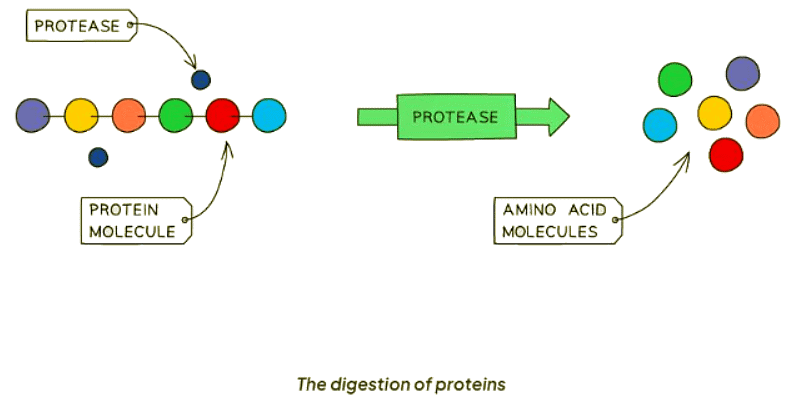Class 10 Exam > Class 10 Notes > Biology for GCSE/IGCSE > Digestion of Protein
Digestion of Protein | Biology for GCSE/IGCSE - Class 10 PDF Download
Digestion of Protein: Extended
- Proteases are enzymes that break down proteins into amino acids in the stomach and small intestine. The enzymes in the small intestine are produced in the pancreas.

- Protein digestion occurs in the stomach and duodenum through the action of two primary enzymes:
- Pepsin, produced in the stomach, functions to break down proteins under acidic conditions.
- Trypsin, originating in the pancreas, is released into the duodenum, where it carries out protein digestion under alkaline conditions.
Explanation of Digestion of Protein: Extended
- Proteases, including enzymes like pepsin and trypsin, play a crucial role in breaking down complex proteins into simpler amino acids during digestion in the stomach and small intestine.
- Pepsin, primarily produced in the stomach, functions optimally in acidic environments, initiating the breakdown process of proteins into peptides.
- Trypsin, on the other hand, is secreted by the pancreas into the duodenum and operates effectively in alkaline conditions, further breaking down proteins into smaller peptides and amino acids.
- The breakdown of proteins into amino acids is essential for the body to absorb and utilize these building blocks for various physiological functions, such as muscle repair and growth.
Importance of Protein Digestion
- Adequate protein digestion ensures that the body receives essential amino acids necessary for synthesizing new proteins required for tissue repair, enzyme production, and immune function.
- Insufficient protein digestion can lead to malabsorption issues, nutrient deficiencies, and impaired overall health and well-being.
Digestion of Proteins
Pepsin and Trypsin are important enzymes involved in the digestion of proteins.
Pepsin
- Pepsin is primarily produced in the stomach.
- It functions in breaking down proteins under acidic conditions.
- For instance, in the stomach, pepsin helps convert proteins into smaller peptides for easier absorption.
Trypsin
- Trypsin is mainly produced in the pancreas and is released into the duodenum.
- It acts in breaking down proteins under alkaline conditions.
- When food enters the duodenum, trypsin plays a crucial role in further breaking down proteins into amino acids.
It is essential to understand the specific roles of these enzymes in different parts of the digestive system to ensure effective protein digestion.
Question for Digestion of ProteinTry yourself: Which enzyme is primarily produced in the stomach and functions optimally in acidic conditions?View Solution
The document Digestion of Protein | Biology for GCSE/IGCSE - Class 10 is a part of the Class 10 Course Biology for GCSE/IGCSE.
All you need of Class 10 at this link: Class 10
|
110 videos|210 docs|33 tests
|
FAQs on Digestion of Protein - Biology for GCSE/IGCSE - Class 10
| 1. Why is protein digestion important for the body? |  |
Ans. Protein digestion is important for the body because proteins are essential nutrients that play a critical role in building and repairing tissues, supporting immune function, and acting as enzymes for various biochemical reactions in the body.
| 2. How does the process of protein digestion begin in the human body? |  |
Ans. The process of protein digestion begins in the stomach, where hydrochloric acid and the enzyme pepsin break down proteins into smaller polypeptides.
| 3. What are the main enzymes involved in the digestion of proteins? |  |
Ans. The main enzymes involved in the digestion of proteins are pepsin, trypsin, and chymotrypsin, which work together to break down proteins into amino acids.
| 4. How are amino acids absorbed by the body after protein digestion? |  |
Ans. Amino acids are absorbed by the body through the small intestine, where they are transported into the bloodstream and carried to cells throughout the body for use in building new proteins.
| 5. What happens if protein digestion is impaired or incomplete in the body? |  |
Ans. If protein digestion is impaired or incomplete, it can lead to malnutrition, deficiencies in essential amino acids, and various health problems such as muscle wasting and impaired immune function.
Related Searches















